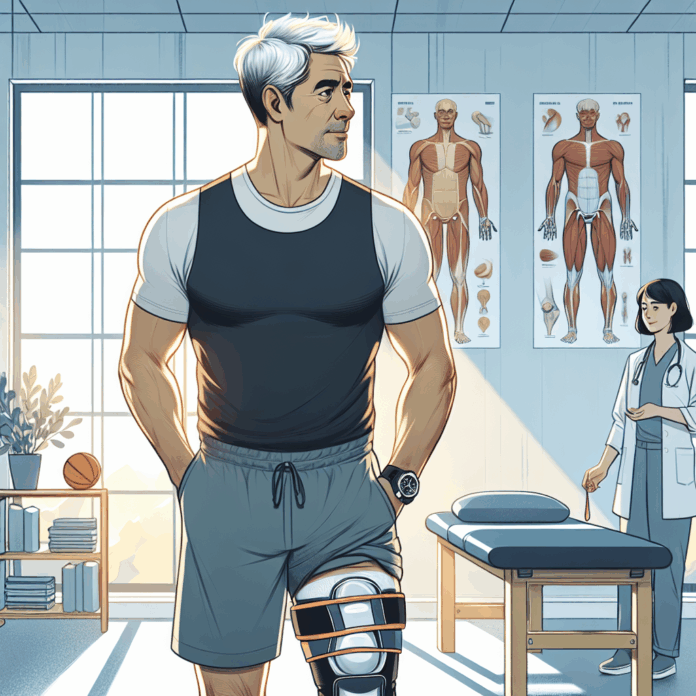For individuals in their 50s and 60s, deciding on ACL reconstruction surgery can be a daunting prospect. Is it really necessary as you age, or can you maintain an active lifestyle without it? In this blog, we will delve into the complexities of ACL injuries in older individuals, examining the potential benefits and risks of surgery, and exploring alternative options. As Dr. David Guyer, a seasoned orthopedic surgeon and sports medicine specialist, shares his insights, we aim to provide a comprehensive guide that helps you make an informed decision that aligns with your personal health goals and activity levels. Whether you’re concerned about knee stability or looking at ways to enhance your quality of life after an injury, this blog offers valuable information and expert perspectives.
Understanding ACL Injuries and Treatment Options
The anterior cruciate ligament (ACL) is a crucial component of knee stability. Its primary role is to prevent the tibia, or shinbone, from sliding out from under the femur, especially during high-impact activities such as jumping or sudden directional changes. ACL injuries are not uncommon, particularly among athletes, and surgery is often recommended to restore knee stability. However, for people in their 50s or 60s, the decision to undergo ACL reconstruction is more nuanced and personalized.
Evaluating the Need for Surgery
Historically, orthopedic surgeons followed an age-based criterion for ACL surgeries, typically advising against surgery for those over 40. This guideline, however, has evolved. Modern orthopedic practice now emphasizes the patient’s activity level and knee stability over age alone. This shift acknowledges that older adults today are more active than ever and may engage in sports or recreational activities that require a stable knee.
For those who are still actively participating in high-level sports or activities that involve frequent jumping or sudden direction changes, like soccer or martial arts, ACL reconstruction can be a viable option. These activities place substantial stress on the knee, and without a functioning ACL, there’s a heightened risk of further knee injuries. Surgery in such cases aims to restore stability, allowing individuals to continue enjoying their chosen activities without the fear of knee instability.
Conversely, for individuals whose physical activities are less demanding, such as walking or jogging on a straight path, ACL surgery may not be as immediately necessary. These activities do not exert the same lateral forces on the knee, and many can manage their daily activities adequately without a fully functional ACL.
Long-Term Considerations and Alternatives
The decision whether to pursue surgery should also consider the long-term health of the knee. While surgery can potentially reduce the risk of future cartilage damage and arthritis due to stabilized joint mechanics, it is not a guarantee against developing arthritis. Post-surgical arthritis is still a possibility, and thus, the primary goal of surgery remains stabilization rather than arthritis prevention.
For those who opt against surgery, there are alternative treatment methods to explore. Regenerative treatments, which Dr. Guyer specializes in, can be a worthwhile consideration. These approaches aim to enhance tissue regeneration and improve joint function without invasive procedures. Moreover, physical therapy plays a crucial role in strengthening the muscles around the knee, compensating for the loss of the ACL, and improving joint stability.
It’s also helpful to consider lifestyle changes that can support knee health. Weight management, dietary modifications to reduce inflammation, and incorporation of low-impact exercises like swimming or cycling can contribute significantly to maintaining knee function and overall health.
Making an Informed Decision
When making a decision about ACL reconstruction, it’s essential for individuals in their 50s or 60s to have a thorough consultation with their healthcare provider. They should discuss their current activity levels, future activity goals, and any underlying health conditions that might influence the success of surgery or recovery.
- Considerations before Surgery:
- Current level of activity and future goals
- The potential for knee instability in chosen activities
- Long-term joint health and arthritis risk
- Personal healthcare history and overall physical health
- Alternatives to Surgery:
- Regenerative medicine techniques
- Physical therapy tailored to specific needs
- Lifestyle modifications for joint health
Ultimately, the decision to undergo ACL reconstruction in later life should be based on a holistic understanding of individual health circumstances, lifestyle, and goals. By weighing the pros and cons of surgery alongside personal preferences and consulting with a trusted medical professional, individuals can make informed decisions that best suit their long-term health and well-being. Remember, while ACL injuries can pose difficulties, various pathways can help maintain an active, healthy lifestyle.
